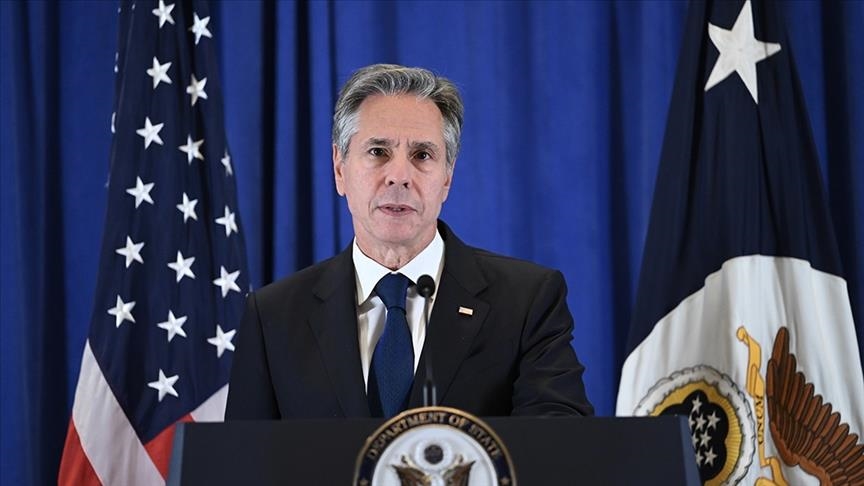OPINION - Gaza cease-fire negotiations: Blinken's mission impossible
Without the political will to cut off aid to Israel, Biden and Blinken cannot do much to pressure Netanyahu

The author holds a master's degree and PhD in history from Istanbul’s Sabanci University, where he taught Turkish history for nine years.
ISTANBUL
US Secretary of State Antony Blinken's fifth tour of Eastern Mediterranean capitals in the past four months (he now looks a bit haggard) seems to have played out similarly to the previous trips. Though this visit coincided with the hopeful news that Hamas responded positively to current cease-fire proposals and offered their own conditions, Israeli Prime Minister Benjamin Netanyahu almost immediately eradicated the budding hopes, continuing his scorched-earth intransigence towards the idea of a negotiated end to the conflict. Reports indicate that the sides continue to discuss conditions.
Meanwhile, Blinken’s inability to crowbar meaningful compromises out of the Israeli leadership has resurrected the “Is Blinken too nice?” theme from early 2021, when Blinken was tabbed for the job. In an election year, foreign policy has relevance not just to US global leadership; voters are looking closely at whether US President Joe Biden’s administration functions effectively, and in a manner that they support. The Democratic Party’s intergenerational strife, which was damaging but not fatal in 2020, has gained a heated and divisive foreign policy dimension as Generation Z sees the Palestine-Israel conflict in terms that starkly diverge from the Boomer perspective.
Blinken’s mission impossible
Blinken’s essential problem is that he has been handed the political equivalent of a “mission impossible.” The Biden administration is affected by several currents that make it extremely difficult — maybe completely unrealistic — for them to pressure the Israeli government in the necessary manner, that is, by threatening to cut off military and/or economic aid, or even taking steps to do so.
First is the general pro-Israel political mentality and atmosphere in the US, which is embraced almost as strongly by most Democratic Party voters as by Republican Party voters. Biden’s long-standing and rigid support for Israel reflects that reality. Biden may not like Netanyahu, but cutting off aid to Israel seems to be a step that Biden refuses to even contemplate. [5]
Second is the fact that the US is in an election year, so Biden cannot make any sort of controversial political decisions. Most Americans would be shocked or even infuriated by a move to cut off aid to Israel, which would potentially mean large numbers of lost votes. Former President Donald Trump, who is more likely to be the Republican Party presidential candidate with each passing day, loudly claims an even more aggressively pro-Israel stance. Subsequently, Biden can give no ground on that issue.
The last important factor is the situation in Congress, which is resolutely pro-Israel, especially those who are up for re-election this fall and whose voting base is not comprised of Generation Z voters, or voters who, for other reasons, support stronger pro-Palestinian policies. Biden is threatening to veto any aid bill that contains aid for Israel but not Ukraine, for example, but the House of Representatives is controlled by Republicans who want to aid Israel but not Ukraine.
Is true pressure even an option?
Netanyahu is well aware of the factors enumerated above, and they are why he ignores Blinken's attempts to pressure him. Even if Blinken were to be “stern” behind closed doors, or if Biden were to “chew out Bibi on the phone,” [7] Netanyahu knows that their hands are tied. Besides feeling righteous in his cause, Netanyahu does not feel any pressure to behave more humanely.
Without the political will to cut off aid to Israel, Biden and Blinken cannot do much to pressure Netanyahu. Even though a nearly unanimous international consensus concerning the need for a Palestinian state has now emerged, and even President Biden publicly supports that goal, Netanyahu remains defiant.
Thus, if the current cease-fire negotiations end up bearing fruit, it will only be because Hamas has fought the Israelis effectively. When Netanyahu claims that victory is “within reach,” I hear echoes of US officials claiming that victory could be achieved in Vietnam, or of the countless rhetorical flourishes used to justify the latest US military initiative in Afghanistan. In the end, it will most likely be Hamas that forces Israel to agree to a cease-fire, not Secretary Blinken talking tough to Prime Minister Netanyahu.
[3] https://www.politico.com/news/magazine/2024/02/06/blinken-too-nice-israel-hamas-00139724; https://www.politico.com/news/2024/02/06/blinken-approach-middle-east-00139988; https://www.aa.com.tr/en/americas/analysis-biden-administration-peers-at-the-eastern-mediterranean/2139969
[5] For example, only after four months, the obliteration of half of Gaza, and more than 27,000 Palestinians dead, did Biden make these statements: https://www.nytimes.com/live/2024/02/09/world/israel-hamas-war-gaza-news#biden-israel-gaza
[7] https://www.politico.com/news/2024/02/06/blinken-approach-middle-east-00139988; https://www.politico.com/news/magazine/2024/02/04/biden-third-party-peril-00139380
*Opinions expressed in this article are the author’s own and do not necessarily reflect the editorial policy of Anadolu.
Anadolu Agency website contains only a portion of the news stories offered to subscribers in the AA News Broadcasting System (HAS), and in summarized form. Please contact us for subscription options.







